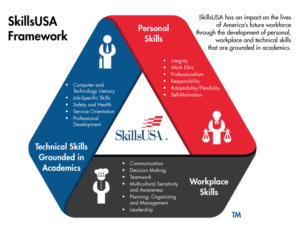Through career and technical student organizations (CTSOs), students build leadership, problem-solving and communication skills. Further, CTSO involvement can help students become more engaged in their studies >amp; inspire them to change the world. “Students learn to connect with others, plan events and win at life,” wrote Rachael Mann. The opportunity to gain real-world experience while still in high school gives them a competitive advantage.
Engage students in academic, technical >amp; employability skill development.
“SkillsUSA evolved my curriculum,” said Gloria Houston, a health care instructor and CTSO chapter advisor in Missouri. “It totally changed the way I teach.” Since getting involved, Houston has built her curriculum around elements of the SkillsUSA framework.
>nbsp;

Further, Houston relates to her students, and she holds them accountable. The work to develop interpersonal relationships makes students feel safe. And when students feel safe, they may learn. Accountability and expectations of professionalism set students up for success in the workplace.
The most recent impact report from DECA demonstrated strong value for CTSOs in developing academic, technical and employability skills:
- 98% gained skills in problem solving
- 97% learned how to communicate thoughts and ideas
- 92% felt empowered to become effective leaders
- 91% felt CTSOs connected school to the real world
CTSOs inspire students to change the world.
Students engaged in CTSOs grow and develop skills, but they also learn what it means to be active citizens in their communities and the planet. “This is where change takes place,” Houston commented.
Consider the work of an FFA student in Illinois. Elaan Bader, a senior at Litchfield High School created a public awareness campaign about insect pollinator habitat and safety. “While there are other forms of pollination, bees and monarch butterflies pollinate 84% of the foods that require it,” said Bader. “These insects are an essential part of our food security equation, so it’s important that we protect them — and it starts with education.”
Bader’s experience with FFA, and enrolled in CTE, taught her that effective learning includes a hands-on component. “Everyone I teach has the opportunity to create interactive bee robots made from toothbrush heads and small, battery-operated motors,” she continued. After each session, learners take away seeds and a greater appreciation for the insects in our flowers. And Bader, who won the 2021 Illinois FFA proficiency in agricultural education, won’t stop there. She’s a CTE student on a mission.
Challenge students to believe in themselves.
Joseph Chapman, a CTSO chapter advisor in South Carolina, described his “favorite conversation with a student.” In fact, he said it nearly brought him to tears. “She told me she had no confidence in herself before SkillsUSA. But now she knew she was smart and could make it.”
Career and technical student organizations challenge students to set goals for themselves they may have never thought possible. So much so that two-thirds of students involved with DECA in 2020–21 reported an increased desire to own a business. “Our local industry has been stunned by my students’ professionalism, communication and maturity,” Chapman continued. “CTE provides students with the means to acquire the skills employers value.”
DECA award winners are future industry leaders.
https://youtu.be/TtQLgPFyFxs
Lia Milgram is managing editor at ACTE.
Related content
- CTSOs engage students: Discover ag under water
- Business Professionals of America, servant leadership, service learning >amp; inspiring agents of change
- SkillsUSA students practice personal, workplace and technical skills
- FBLA-PBL students compete among the best
- DECA brings the classroom to life
- CTSOs engage students: Educators Rising to the challenge
- CTSOs engage students: FCCLA, featuring Stephanie Zhang
- HOSA inspires skilled, competent, qualified advocates
- Technology Student Association members learn to lead in a technical world






